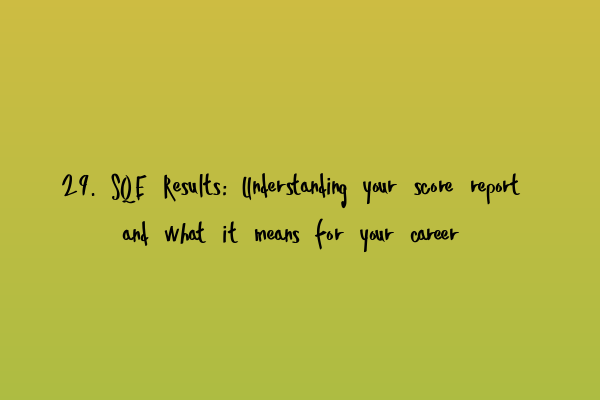29. SQE Results: Understanding your score report and what it means for your career
After months of hard work and preparation, you have finally completed the Solicitors Qualifying Examination (SQE). Congratulations! But now, it’s time to understand what your score report means for your legal career. In this blog post, we will break down the key components of the SQE score report and provide guidance on how to interpret and leverage your results to boost your professional prospects.
Understanding the SQE Score Report
Upon receiving your score report, you may come across various terms and statistics that can seem overwhelming at first. Let’s delve into each section of the score report to make sense of the information it provides:
1. Overall Performance
The overall performance section gives you an insight into how you fared in the exam as a whole. This is a crucial indicator of your competence and will be of great interest to potential employers reviewing your application. Take note of your overall performance score as it will serve as a benchmark for your career progression.
Understanding your overall performance is vital, but it’s equally important to recognize the areas in which you excelled and those in which you may need improvement.
2. Section Performance
The section performance breakdown highlights your performance in each section of the SQE. This breakdown allows you to pinpoint your strengths and weaknesses across various legal practice areas.
By analyzing your section performance, you can identify the areas where your knowledge and skills are strongest and focus on further developing them to become a specialist in that particular field of law. Likewise, areas in which your performance was weaker can be targeted for improvement through additional study and training.
Use the information from this section to plan your future career path strategically. Whether you aspire to be a litigator, corporate lawyer, or specialist in a specific practice area, understanding your section performance will help you make informed decisions.
3. Comparative Performance
The comparative performance section provides data on how your scores compare to other candidates who took the SQE. This data is anonymous and provides insight into the overall performance trends across the candidate pool.
While individual performance is essential, understanding the average performance of other candidates can help put your own results into context. It allows you to gauge where you stand in comparison to your peers and identify areas where you may need to work harder to remain competitive in the legal job market.
Remember, the SQE serves as a standardized assessment for all candidates, and understanding the competitive landscape can guide your career decisions and help you set realistic goals.
Using Your SQE Score Report to Enhance Your Career
Now that you have a clear understanding of the various sections of the SQE score report, it’s time to explore how you can leverage your results to boost your legal career:
1. Identifying Strengths and Weaknesses
By analyzing your score report, you can identify your strengths and weaknesses across different legal practice areas. This self-awareness allows you to tailor your career path and focus on areas where you excel. Consider seeking further specialization or gaining additional experience in these areas to position yourself as an expert.
2. Targeted Professional Development
Understanding your score report helps you identify the areas where you need improvement. Take advantage of resources, such as mock tests and sample papers, to refine your knowledge and skills in these weaker areas. Check out these related articles for more information:
- Conquer the Multiple Choice Questions (MCQ) in SQE1
- Interactive mock tests for SQE: Enhancing engagement and learning
- SQE Sample Papers: Practice for Exam Success
- Focus Areas in SQE1 and SQE2: Mastering Key Concepts
- Adjusting Your SQE Strategy Based on Mock Performance
3. Showcasing Your Results
Your SQE score report can be a valuable asset when applying for legal jobs. Highlighting your strengths and overall performance in your resume and cover letters can set you apart from other candidates. Additionally, securing strong references from professors or employers who can vouch for your performance in specific practice areas will further strengthen your application.
Whether you choose to include your entire score report or just the relevant score ranges, make sure to explain the significance of your achievements and how they align with the requirements of the job you are applying for.
4. Continuing Professional Development
SQE score reports should not be seen as the end of your professional development journey but rather as a stepping stone. Regardless of your score, ongoing learning and improvement are vital to progress in your legal career.
Consider attending continuing professional development (CPD) courses and staying up to date with legal developments to showcase your commitment to growth and enhance your career prospects.
Conclusion
Understanding your SQE score report is crucial for leveraging your results to advance your legal career. By analyzing your overall performance, section performance, and comparative performance, you can identify your strengths, weaknesses, and areas of improvement. Use this knowledge to strategically plan your career path, pursue targeted professional development, showcase your results to potential employers, and continue your journey of professional growth through CPD opportunities.
